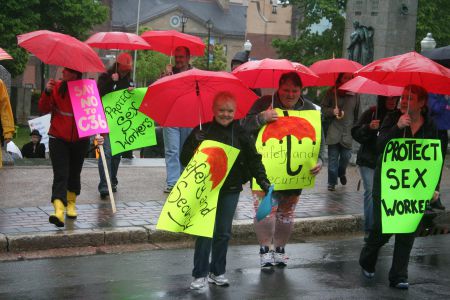KJIPUKTUK (HALIFAX) – The recent arrests of 27 men in Sydney, Cape Breton, charged with obtaining sexual services, raises concerns about the safety of sex workers.
The charges are laid under Bill C-36, a controversial law proclaimed in December of last year. That legislation criminalizes men who seek out sex workers.
Many sex workers and allies argued at the time that the legislation would make prostitution even more dangerous.
But that is not stopping Cape Breton Regional Police chief Peter McIsaac.
"This problem isn't going away any time soon and we will assign whatever resources and whatever investigative techniques we have to to clear up that problem downtown," McIsaac told CBC's Maritime Noon.
That problem downtown are the mostly indigenous sex workers who work the downtown Sydney streets.
Many of them struggle with addictions, and most of them no doubt live in deep poverty.
Their presence at all hours caused complaints from local merchants and the Sydney Downtown Development Association.
The complaints were widely reported by local and provincial reporters. Yet no reporter interviewed any of the sex workers affected by the controversies.
Jeanne Faye, executive coordinator at Second Story Women's Centre in Bridgewater, expects that the arrests will cause the women to move to places where they will be even more exposed to danger.
“I talked to a lot of women before Stepping Stone took over,” Faye says, referring to the mid-eighties when she and others worked closely with Halifax sex workers. “They all said the same thing.” “If the cops are patrolling we are at the very back of the parking lots, in places where cops can't see us.”
Sex workers will not go away until underlying problems such as poverty, addiction, and aboriginal trauma are resolved, Faye says.
“Until the socio-economic issues are dealt with there are going to be women who are going to turn tricks to feed their habits and/or their kids,” says Faye.
McIsaac acknowledged there is a concern that the crackdown could push the sale of sex to other areas, reports the Cape Breton Post.
"But it's important that this type of activity can't happen on probably the main street of our municipality," the chief is quoted as saying.
In other words, don't be so visible.
"We're going to deal with this problem until we get it off the main street down there, because it's just unacceptable some of the behaviour that's happening down there, at all hours of the day and night," McIsaac said.
The chief points to successful efforts to get at least some sex workers to seek treatment for addictions.
The chief also mentions that violence against sex workers by some johns appears to be escalating.
He does not explain how relocating sex workers away from the downtown will address that violence.
The Chronicle Herald and the Cape Breton Post have published the names and addresses of the 27 mostly older men who are facing charges, but have not yet been found guilty of anything.
While McIsaac believes that publishing the names is a good thing because it could serve as a deterrent, Faye isn't so sure.
“I don't condone what they did, But imagine the shame that must be felt, not just by the men, but by their families, and their friends,” says Faye.
The Cape Breton Regional Police has embraced Bill C-36. But the same cannot be said for every jurisdiction in Canada.
For instance, after Bill C-36 passed, the City of Vancouver stated that rather than criminalize sex work it would continue to focus on the health and safety of sex workers.
Follow Robert DeVet on Twitter



